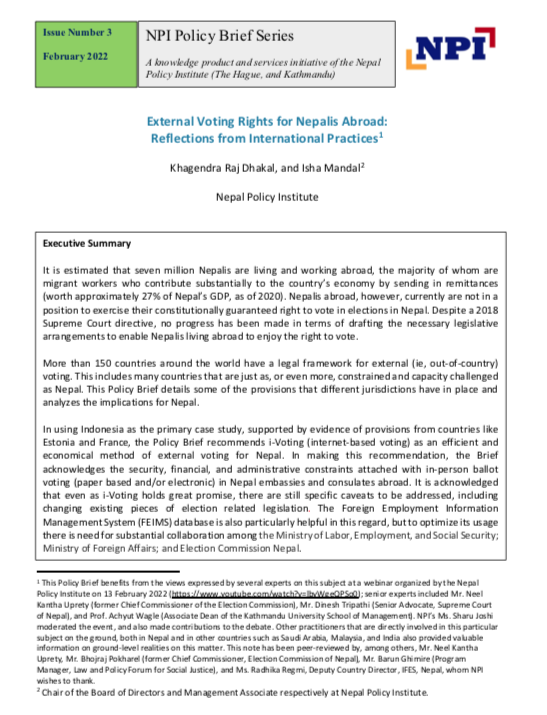Khagendra Raj Dhakal, and Isha Mandal
Nepal Policy Institute
Executive Summary:
It is estimated that seven million Nepalis are living and working abroad, the majority of whom are migrant workers who contribute substantially to the country’s economy by sending in remittances (worth approximately 27% of Nepal’s GDP, as of 2020). Nepalis abroad, however, currently are not in a position to exercise their constitutionally guaranteed right to vote in elections in Nepal. Despite a 2018 Supreme Court directive, no progress has been made in terms of drafting the necessary legislative arrangements to enable Nepalis living abroad to enjoy the right to vote.
More than 150 countries around the world have a legal framework for external (ie, out-of-country) voting. This includes many countries that are just as, or even more, constrained and capacity challenged as Nepal. This Policy Brief details some of the provisions that different jurisdictions have in place and analyzes the implications for Nepal.
In using Indonesia as the primary case study, supported by evidence of provisions from countries like Estonia and France, the Policy Brief recommends i-Voting (internet-based voting) as an efficient and economical method of external voting for Nepal. In making this recommendation, the Brief acknowledges the security, financial, and administrative constraints attached with in-person ballot voting (paper based and/or electronic) in Nepal embassies and consulates abroad. It is acknowledged that even as i-Voting holds great promise, there are still specific caveats to be addressed, including changing existing pieces of election related legislation. The Foreign Employment Information Management System (FEIMS) database is also particularly helpful in this regard, but to optimize its usage there is need for substantial collaboration among the Ministry of Labor, Employment, and Social Security; Ministry of Foreign Affairs; and Election Commission Nepal.
देश बाहिर रहेका नेपाली नागरिकको मताधिकार र अन्तर्राष्ट्रिय अभ्यासहरू
खगेन्द्रराज ढकाल र ईशा मण्डल
नेपाल पोलिसी इन्ष्टिच्युट
कार्यकारी सारंश:
काम र अध्ययनको शिलसिलामा झन्डै ७० लाख नेपाली नागरीक मुलुकवाहिर वसोवास गर्छन् ।जसमा सवैभन्दा ठुलो बाहुल्यता प्रवासी श्रमिकको छ । उनीहरुले पठाएको बिपे्रषणले २०२० मा मुलुकको कुल ग्राहस्थ उत्पादन (जिडिपी)मा करिव २७ प्रतिशत योगदान पु¥याएको थियो । मुलुकबाहिर रहेका नेपालीले संबिधानद्धारा सुनिश्चित गरिएको मताधिकारको प्रयोग गर्न पाएका छैनन् ।२०१८ मा सर्वोच्च अदालतद्धारा मुलुकबाहिर रहेका नेपाली नागरीकको लागि आवश्यक कानुन वनाएर मताधिकारको अभ्यास गराउन दिइएको निर्देशात्मक आदेश अझै कार्यान्वयनमा नआँउदा आगामी स्थानीय, प्रदेश र संघीय निर्बाचनहरुमा देश बाहिर रहेका नेपालीहरुको मतदान गर्ने अधिकार सुनिश्चित हुन सकेको छैन ।
विश्वभर रहेको एकसय ५० भन्दा बढी देशहरुसँग मुलुकबाहिर रहेका आफ्ना नागरीकहरुको मताधिकार सुनिश्चित गर्ने कानुनी संयन्त्र छ ।यसमा नेपालजस्तै वा अझ सीमित स्रोत साधन भएका धेरै देशहरु समावेश छन् ।यो नीति संक्षेप नेपाललाई देश बाहिर रहेका नागरिकहरुको मतदानको व्यवस्था लागु गर्न मद्दत पुग्ने अवश्यक नीति नियमहरु निर्माण गर्न उपयोगी विभिन्न परिवेशका अन्तर्राष्ट्रिय प्राबधानहरु प्रस्तुत गरेको छ ।
इन्डोनिया,एस्टोनिया र फ्रान्सले गरेको अभ्यास हेर्दा आर्थिक र प्रभाबकारीताको दृष्ट्रिकोणले नेपाललाई आइ–भोटिङ (इन्टरनेटमा आधारीत मतदान)मा जानको लागि यो नीति संक्षेपको सुझाब छ ।नेपाली दूतावास वा महावाणिज्य दूतको कार्यालय वा अन्य संयन्त्रको व्यवस्था गरि भौतिक रुपमा ब्यक्ति स्वयम उपस्थीति भई कागजी वा विद्युतीय मतदान गर्न सुरक्षा,आर्थिक र प्रशासिनक रुपमा अड्चन देखिन्छ । आइ–भोटिङ एउटा निकै उपयोगी र सहज उपाय भए पनि यसको कार्यन्वयन गर्न राज्यको ठुलो इच्छाशक्ति चाहिन्छ ।यसको लागि अझै देखिएका विशेष चुनौतीहरुलाई सम्बोधन गरिनुपर्छ ।निर्वाचनसँग सम्वन्धी कानुनहरुलाई प्राथमिकता साथ शंशोधन गरि आवश्यक नीतिहरु तय गर्नु जरुरी देखिन्छ ।यसमा वैदेशिक रोजगार सुचना व्यवस्थापन प्रणाली (फेमिस)ले ठुलो सहयोग पुयाउँछ ।तर,यसलाई अधिकतम प्रयोग गर्न श्रम,रोजगार तथा सामाजिक सुरक्षा मन्त्रालय,परराष्ट्र मन्त्रालय र निर्वाचन आयोग वीच आपसीरुपमा वलियो समन्वयको व्यवस्था हुन जरुरी देखिन्छ ।
(यो नेपाल पोलिसी इन्ष्टिच्युटद्वारा प्रकाशित नीति संक्षेप अंक ३ को कार्यकारी सारंशको नेपाली अनुबाद हो। यसको पुरा भाग यो लिंक मा उपलब्ध छ: https://nepalpolicyinstitute.org/external-voting-rights-for-nepalis-abroad-reflections-from-international-practices/)
Document Type: Policy Brief
Access: Open
Country: Nepal
Keywords: Migrant workers, Supreme court, voting, Indonesia, Nepal, i-voting, Election Commission Nepal
Citation: Dhakal, K. R. & Mandal, I. (2022). External Voting Rights for Nepalis Abroad: Reflections from International Practices. NPI Policy Briefs, No 3, The Hague: Nepal Policy Institute.
https://nepalpolicyinstitute.org/wp-content/uploads/2022/02/PB3.pdf


3 Responses
Well done work – Congratulations NPI Team. Let us hope that valied arguments and suggestions put forward by NPI justifying the voting right to eligible Nepalese living and working abroad will be granted. Fully support 🌷
Yes I need too
Dear sir/ Madam
Namaste frome sankalpa Nepal
First, I hope this mail finds you and your loved ones safe and Healthy.
I humbly request that these International non-government organizations (INGOs) have been carrying out various activities in Nepal for a long time to help the women, children, dalit, janajati, LGBTQ etc vulnerable community. In this District (Sudur paschim province, Darchula) also, there is a request to conduct the next program in partnership with Sankalpa. Sankalpa has adopted the right-based approach at strategic and practical levels because it believes that all people are entitled to the ‘rights’ that are enriched in the National and international laws and conventions. Sankalpa has been addressing the subject of inequality, powerlessness, suffering and material poverty. Sankalpa Darchula Nepal (Sankalpa) is a community Based organizations (CBOs)/ NGO dedicated to Human Rights, Food security, Health and wash, Education, Water Governance, Climate, Peace Building, Media and Development in Sudur Paschiem Province since 1997. It works with a mission to enable rural people to claim and exercise their rights promoting and protecting human rights through the National rule of law, poverty reduction and improved livelihoods through their organization, research, policy advocacy and judicious resources mobilization. It has been implementing various project/programs with the funding support of different community Based organizations (CBOs) and users Groups. Theme area as belows.
WASH and Water Governance (Public Health).
Resilience and Climate Justice including humanitarian response.
Education and Child Protection and Disabilities.
Gender and Social Justice and Human Right.
Nature-Based Solutions/ River Right.